Becoming the best we can
Curriculum
Wider curriculum subjects are taught through a thematic (topic) based approach, planned for in line with the expectations of the National Curriculum.
The current cycle runs on a 2 year programme enabling teachers to plan in year group teams and ensuring that all children in the same year group receive the same opportunities irrespective of which class they are in.
Wider curriculum learning is displayed in each classroom on displays, promoting substantive knowledge and the key vocabulary of current learning. Further enrichment opportunities are planned for to support an engaging curriculum for example, RE visits and Arts Week. We are in the process of reviewing our wider curriculum and will be uploading the new learning journeys.
Curriculum subjects
An overview of subjects covered can be found below
Reading and Phonics
At FCCE we LOVE reading! By choosing exciting books, promoting book talk and having daily story time sessions, we aim to develop all children’s love of reading. Children are exposed to a variety of authors from the past through to the present, promoting a range of genres within non-fiction and fiction texts.
Phonics
To ensure our pupils develop strong reading foundations, we have adopted the Little Wandle Letters and Sounds Scheme across the school. This systematic approach to teaching phonics equips our pupils with the essential skills they need to become confident, fluent readers. Through daily, structured phonics lessons, our pupils learn to decode words effectively, building a secure understanding of letter-sound relationships.
For more information, please follow this link. https://www.littlewandlelettersandsounds.org.uk/resources/for-parents/
Key Stage 2
Recognising the importance of reading comprehension as a crucial life skill, we have adopted Fred’s Teaching Scheme in Key Stage 2. This approach encourages our pupils to delve deeper into texts, developing their ability to analyse, interpret, and critically engage with the written word. Through targeted lessons and discussions, our pupils learn to extract meaning, make inferences, and articulate their understanding of the texts they encounter.
Reading Enjoyment
At Frampton Cotterell CofE Primary School, we believe that reading is a shared experience that brings our community together. We actively involve parents and carers in their children’s reading journeys, providing guidance and resources to support learning at home. We have a school library and will be launching our outdoor reading shed in the coming weeks, to help our community foster a lifelong love of reading.
Reading at home & support
We ask that every child reads at home at least 5 times a week and that there is a note of this in their reading record. If your child is struggling to read at home try…
- Taking it in turns to read their story book (a sentence/ page each.)
- Mix up books with reading recipes, websites, magazines etc.
- Go to a bookshop/ library and help them choose books they are excited about.
Help your child create a cosy reading area that they are excited to read in.
Before reading the book, start by helping your child to engage in their book (e.g. if the book is about dogs, start by chatting with your child about dogs, drawing a picture of a dog, researching dogs online etc.)
Links for home learning & enjoying books
https://www.thereaderteacher.com This is a great website for finding new and exciting books & authors.
https://www.lovereading4kids.co.uk You can read samples of books here & search by genre.
Writing
At FCCE, we are all authors! Each class has a daily Literacy lesson which helps to develop important writing skills. There are many different elements to these sessions and are usually taught through different genres of writing. Here are some of the things we practise on a regular basis:
Handwriting
The children are given handwriting sessions each week. These lessons focus on improving the pupil’s presentation skills. The school follows the fully cursive and joined hand writing style.
Grammar and Punctuation
Classes in Key Stage 1 and 2 will have specific lessons based on teaching the correct use of grammar and punctuation. This can take many different forms but will concentrate on children writing grammatically-accurate sentences with various types of punctuation used correctly.
‘Big Write’
In Key Stage 2, each class will work towards completing a ‘Big Write’. Every fortnight, pupils will be given the opportunity to plan, draft, edit and publish a piece of independent writing. This work is then used to help assess your child’s writing skills.
Spellings
Your child will have a variety of spelling strategies taught during each term and parents will be informed of their progress at the end of each term.
Maths
We strive to teach a full and rich mathematics curriculum to enable all of our children to become happy and confident mathematicians.
At Frampton, we recognise the importance of mathematics as a skill which underpins so many aspects of everyday life. Because of this, we want every child to see themselves as a capable mathematician who enjoys the subject. We work hard to create a positive culture around maths, where children are encouraged to be confident, resilient and curious learners. This is something that starts in EYFS where we begin to develop basic number skills by using manipulatives and exploring number and patterns in a range of ways.
Our calculation approach is based on the White Rose Maths scheme, which provides a clear and consistent progression of methods. This helps children to build strong number sense and deepen their understanding step by step.
In lessons, children revisit and build on skills through a carefully sequenced and progressive approach. They take part in Learn it, Solve it, Prove it tasks, which develop fluency, reasoning and problem-solving skills. Teachers also use a balance of concrete, pictorial and abstract resources to support learning and ensure concepts are fully understood.
The mathematics curriculum is divided into the nine key areas of the National Curriculum and are measured against Age Related Expectations and Standards:
- Number and Place Value
- Addition and Subtraction
- Fractions, Decimals and Percentages
- Ratio and Proportion
- Algebra
- Measurement
- Geometry
- Statistics
For more detail, you can view the official White Rose Maths calculation policies directly on their website.
To encourage a love of maths further and to enable children to practise fluency skills, we also use Times Tables Rockstars.
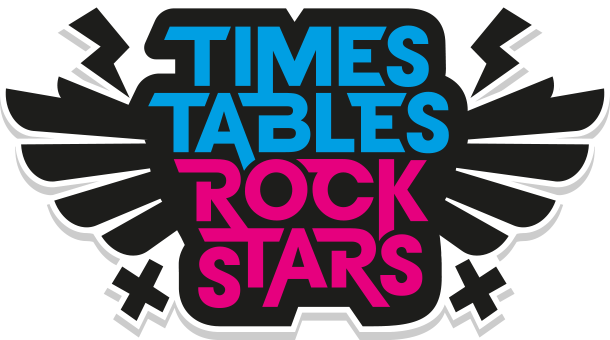

Useful links to support your child’s maths learning at home
For all age groups
Topmarks https://www.topmarks.co.uk/Search.aspx?Subject=16
Mathsframe https://mathsframe.co.uk/en/resources/category/22/most-popular
Mathplayground https://www.mathplayground.com/
Cool Maths 4 Kids https://www.coolmath4kids.com/
Supermovers https://www.bbc.co.uk/teach/supermovers/ks2-maths-collection/z7frpg8
KS1
https://www.bbc.co.uk/cbeebies/topics/numeracy
Ideas for games that aren’t online
https://thirdspacelearning.com/blog/fun-maths-games-activities-for-kids/
https://www.youtube.com/channel/UCob4tkfOSXy6yav9Y54SKIQ
KS2
https://thirdspacelearning.com/blog/16-fun-maths-activities-ks2-back-to-school-summer-brain-drain/
Maths apps with a subscription fee
Science
Science is taught primarily through our Topic cycle. However, children may have discrete Science lessons to cover certain aspects of the Science curriculum.
There is a significant emphasis on practical investigations encouraging pupils to ask questions, make accurate observations and test hypotheses.
Click here for National Curriculum 2014 agreed Science Coverage for Primary School children.
History
History at FCCE is taught primarily through our Topic cycle.
However, children may have discrete History lessons to cover certain aspects of the National Curriculum.
Geography
Geography at FCCE is taught primarily through our Topic cycle.
However, children may have discrete Geography lessons to cover certain aspects of the National Curriculum.
Religious Education
Religious Education (RE) is taught across all phases. We use the Understanding Christianity scheme for three terms of learning and three terms each year are given to teaching worldviews, using a two year cycle (Islam, Hinduism, Judaism & Sikhism).
As an ‘inclusive and vibrant’ school, we aim to teach RE in an exciting and relevant way to our pupils and this has been reflected in our recent receipt of the WIRE (Widening Inclusion and Religious Education) award. We have 2-3 faith days a year where we invite members of different faiths to talk to us on different topics. We make trips to the Church, Mosques, Gurdwaras and Synagogues. We learn through art, drama, story telling and debates, honing our skills as Philosophers, Social Scientists and Theologians.
RE at Frampton is taught in two year rolling cycles. Every year, pupils cover 3 modules of the ‘Understanding Christianity’ scheme as well 3 other world views. We try as much as possible to reflect the worldviews held among the families at Frampton and have recently added Humanism to our teaching schemes. Here is a visual representation of our coverage over the two cycles:
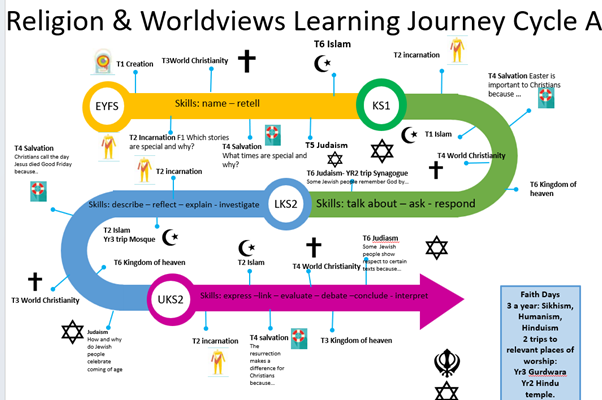
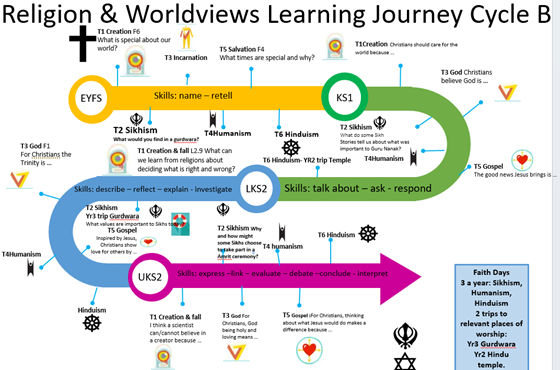
At Frampton, we are proud that our latest Siam’s report (April 2025) reflected on our RE curriculum as a strength of the school saying:
‘The RE curriculum is diverse and well-sequenced, with a clear progression of knowledge and skills. An effective partnership with the Diocese provides valued training which leads to greater staff confidence in RE. The carefully planned curriculum enables the whole school to follow a theme or religion together. The whole-school faith day at the end of each long term expands pupils’ knowledge and understanding further. Consequently, they are able to apply their learning through vibrant, shared experiences of a range of religions and worldviews. The broad and relevant curriculum provides pupils with opportunities to explore faith traditions in different parts of the world. This enhances pupils’ understanding of Christianity as a living world faith. Pupils speak enthusiastically about their learning in RE and even younger pupils are able to explain theological concepts and vocabulary. Older pupils can compare and contrast beliefs, views and practices. They demonstrate understanding of diversity within religions and the way they are lived out in practice. The broad curriculum ensures pupils are able to express and debate their own developing beliefs in RE lessons with confidence and mutual respect.’
Peace Tables
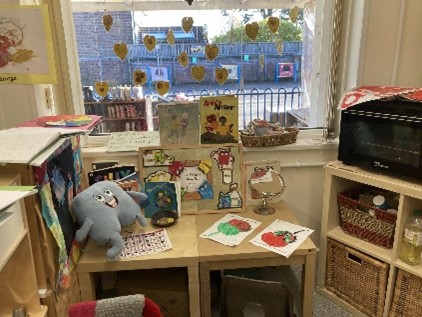
Frampton is proud of its forward thinking, researched-based focus of teaching pupils conflict resolution skills. As an inclusive school which puts a high value on relationships, we feel it is important that pupils learn how to seek and communicate for justice in a positive way, whether that is between peers or in the wider community and beyond. At the beginning of every year, each class is taught a progressive curriculum around nonviolent communication and independent conflict resolution is fostered. This is supported throughout the year using tools such as the peace table/basket within each class. These are explained in the video below:
We also celebrate our peer mediators who are pupils trained up to support others to resolve their conflicts during breaks and lunchtimes.
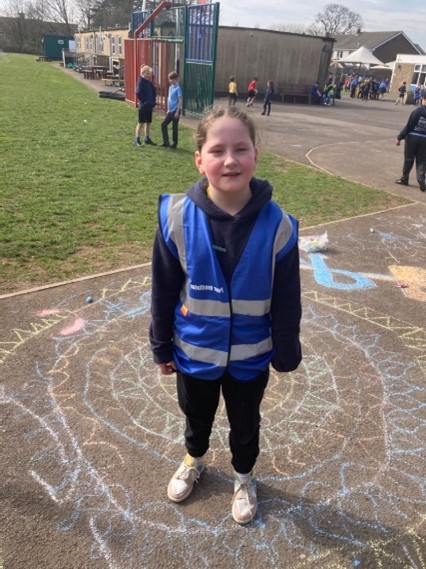
Click here for the intent, implementation and impact for RE.
Physical Education
We are passionate about ensuring every child has the skills necessary to achieve in PE, sport and life through teaching children the physical literacy and emotional thinking skills they’ll need.
This unique and child-centred approach is achieved through our Get Set 4 PE scheme which we follow each week. Each class has 2 PE sessions a week using the scheme. This scheme is a great way to progress pupil’s fundamental movement skills to enable them to apply this to a range of different sports and within everyday life.
Please click on the links below to read more about our Get Set 4 PE scheme or please check out our PE sports board in the hall to learn more about our PE lessons.
Please take a look at this year’s curriculum overview to see which sports and skills each year group will be covering and when.
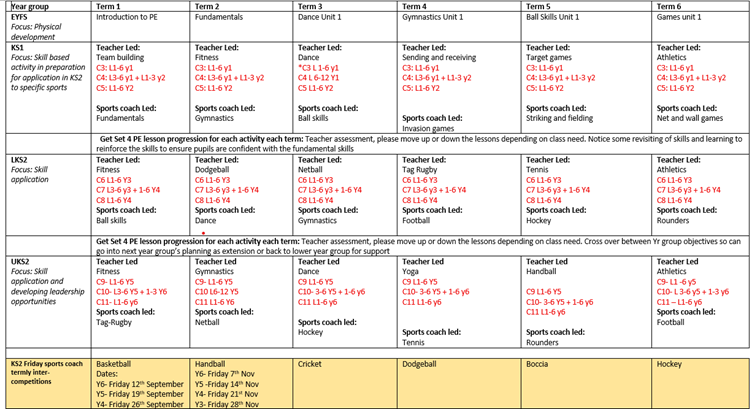
Competition
In addition to this, we have recently introduced a termly competition for each year group, led by our sports coach – Elliott. Each term, each year group has a Friday afternoon to learn the skills of a new sport and have the chance to put these into action at the end with a fun competition.
Frampton Cotterell School has numerous extra-curricular activities both after school and at lunchtime. We take part in numerous out of school competitions and leagues. We have entered into a local netball league and take part in a football league for KS2. Additionally, we take numerous groups to a variety of cluster school matches for tag-rugby, cricket, netball and football and many more.
The Importance of Daily Exercise
Exercising for 30 minutes a day is really important (that is less than 5% of your day). Take a look on the website attachment for lots of different ideas for exercising that you can – lots of them are great fun to do as a family and there are ideas to do inside and outside of your homes.

60 Second Physical Activity Challenges – Youth Sport Trust
Or you may like to have a go at trying one of Miss Newman’s fabulous dance tutorials.
Don’t forget we all love to hear about your sporting triumphs, so please let you class teacher know so we can celebrate these in our weekly celebration assemblies.
Computing
Our computing curriculum follows the South Gloucestershire scheme of work, however, it is adapted to the needs of our children and enriched so that it engages pupils and provides them with the core skills they need to be computer literate in a digital age.
Our curriculum provides opportunities to practice skills across a range of subjects but is predominantly taught discreetly through lessons which enthuse and inspire children of all abilities and ages.
French
Our learning journey for French is to come.
Music
We actively encourage students to become involved in music and love being able to showcase our instrumentalists in performances too!
Click here for our music development plan
Instrumental/vocal tuition in school
We have a range of teachers coming into school. Click here for more info about music lessons.
Art
TBC
DT
At our school, Design and Technology (DT) is a hands-on, creative subject that encourages children to become designers, makers, and problem solvers.
This starts in EYFS through co-play and children are designers, makers and problem solvers every day. In KS1 and KS2 DT is taught through our exciting topic cycles, meaning it links closely with the wider curriculum and helps bring learning to life.
In DT, children follow a clear process: they design, make, and evaluate their creations. This helps them think carefully about purpose, materials, and how to improve their work — developing practical skills as well as creativity and resilience.
Across the school, children take part in a wide range of projects, from making fruit kebabs and sandwiches to designing and sewing fabric bags, making Mayan masks, creating jewellery, constructing Egyptian boats, launching bottle rockets, and even competing in the much-loved Year 6 Bake Off!
Through these engaging activities, pupils learn about food technology, materials, mechanisms, and structures while gaining confidence to bring their ideas to life.
PSHE
TBC
British Values and SMSC
British Values
At Frampton Cotterell Primary School, we aim to promote the Fundamental British Values of:
- Democracy
- The Rule of Law
- Individual Liberty
- Mutual Respect
- Tolerance of those of different faiths and beliefs
These values are embedded throughout our curriculum and wider school life. They help our pupils develop into responsible, respectful citizens who are ready to play a positive role in modern Britain and they feed in to our school values of thankfulness, hope, honesty, forgiveness, service and justice.
How we promote British Values
Democracy
Pupils are always listened to by adults and are taught to listen carefully and with concern to each other, respecting the right of every individual to have their opinions and voices heard. As part of our broad and balanced curriculum, pupils have voices heard through pupil surveys, regular class discussions, debates and oracy starters where they learn to express their opinions and listen to and respect others in a safe environment.
The Rule of Law
The importance of laws – whether in the classroom, the school, or the wider country – is continually reinforced throughout the school day, in assemblies, and by ensuring every child follows our behaviour policy. We guide pupils to distinguish right from wrong and help them understand that living under the rule of law offers protection to individuals. Pupils are taught the purpose and value of laws: how they govern and protect us, the responsibilities they bring, and the consequences of breaking them.
Frampton is proud of its forward thinking, researched-based focus of teaching pupils conflict resolution skills. As an inclusive school which puts a high value on relationships, we feel it is important that pupils learn how to seek and communicate for justice in a positive way, whether that is between peers or in the wider community and beyond. At the beginning of every year, each class is taught a progressive curriculum around nonviolent communication and independent conflict resolution is fostered. This is supported throughout the year using tools such as the peace table/basket within each class. We also celebrate our peer mediators who are pupils trained up to support others to resolve their conflicts during breaks and lunchtimes.
Individual Liberty
Within our school, pupils are encouraged to make choices while knowing they are in a safe and supportive environment. We provide boundaries alongside a secure setting and empowering education, enabling them to make these choices with confidence. Pupils are supported in developing their self-knowledge, self-esteem, and self-confidence, and are taught to understand and exercise their rights and personal freedoms in a safe and responsible way. This is clearly reflected in lessons such as e-safety and PSHE. A strong anti-bullying culture is embedded in our school, and every child takes part in Anti-Bullying Week.
Mutual Respect
Our vision is to enable all members of our school community to become the best we can, by being an inclusive, vibrant, aspirational school. This, and our six Christian values, permeate all that we do. Our values are taught through acts of worship, PSHE sessions. Weaved through our curriculum and form a key part of our daily dialogue across school. Respect is promoted across school, and it is deeply embedded in all that we do. The pupils know and understand that it is expected and imperative that respect is shown to everyone, whatever differences we may have. Our children are given regular opportunities to learn within their community and beyond, each time an emphasis is placed on respecting those with whom they come into contact and their surroundings. A very wide range of extra-curricular clubs are offered at Frampton and these clubs provide another opportunity for mutual respect to be secured in the attitudes of our pupils, both amongst those participating from their own setting, and any visiting staff or teams. In addition, we promote respect through Anti-bullying week, YR and Y6 buddies, Faith Days, the use of the peace tables/basket and peer mediators.
Tolerance of Different Faiths and Beliefs
Our curriculum enhances pupils understanding of different faiths and beliefs through RE, PSHE, acts of worship, Faith Days, welcoming visitors into our school and going on themed visits. Subject leaders consider carefully that cultural diversity embedded and celebrated within their subject; for example artists studied, authors, characters in books, scientists, composers.
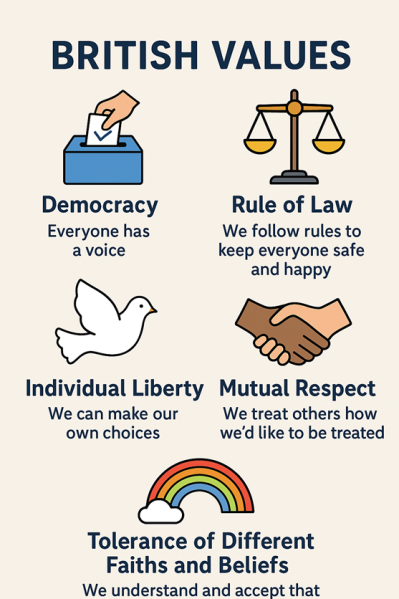
SMSC (Spiritual, Moral, Social and Cultural Development)
SMSC stands for Spiritual, Moral, Social and Cultural Development. At Frampton, we place great emphasis on this and the personal development of our pupils. We aim to provide them with the knowledge, skills and understanding to become thoughtful, caring and active citizens in our community and beyond. We encourage them to ask questions about themselves, their experiences and the world as well as considering the thoughts and feelings of others.
Spiritual Development
We provide children with regular opportunities for reflection and curiosity in lessons and during assemblies. We timetable in opportunities for spiritual moments in all year groups and teach children about the purpose of this. In addition, we plan opportunities in our curriculum to explore beliefs and ask questions and discuss opinions in subjects such as RE, Science and Art. We also have allocated spaces in classrooms and outdoors for children to have time to reflect.
Moral Development
At Frampton, we aim to provide children with a range of opportunities to develop an understanding of right and wrong. We do this throughout the curriculum by offering opportunities to explore this through class discussions, stories, debates and oracy starters. Our school values and Bible stories allow opportunity for this as well. We learn about fairness, honesty and respect on a daily basis in all aspects of school life, including through our behaviour policy.
Social Development
We promote social development by working collaboratively in lessons, in sports and during group activities. Children also have the opportunity to take on extra responsibilities including reading ambassadors, peer mediators, buddies, house captains, lunch time helpers. Year 4 and Year 6 also go on residential trips and all year groups go on a range of trips across the year as well as inviting visitors into classes/assembly to teach about different areas of the curriculum. We also have strong links with our local community and church.
Cultural Development
Our children learn about and celebrate different cultures, traditions and festivals throughout the curriculum and during themed weeks and days including our Faith Days. Children take part in music, art and drama activities throughout the curriculum as well as being offered a range of extra-curricular clubs. We also have an art week every year and we invite a range of visitors in to deliver assemblies and lessons for a variety of subjects and year groups. These could include author visits, parliament assemblies, and figures from the local community. In addition, all year groups partake in a range of trips which are planned with their cultural development in mind.
Please find our SMSC calendar here.
